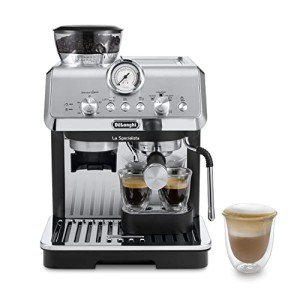Why Dual Boiler Espresso Machines Doesn't Matter To Anyone

Understanding Dual Boiler Espresso Machines: A Comprehensive Guide
Espresso is an art as much as it is a science. For click through the following post and baristas alike, accomplishing the best shot of espresso demands accuracy and control over developing variables. One of the most reliable methods to accomplish this precision is through making use of dual boiler espresso machines. This short article looks into the functionality, advantages, and considerations of dual boiler espresso machines for both beginners and experienced coffee aficionados.
What is a Dual Boiler Espresso Machine?
A dual boiler espresso machine features two separate boilers: one for developing espresso and the other for steaming milk. This style enables the user to brew coffee and steam milk all at once, accomplishing ideal temperature control for both processes. This is important for developing lattes, cappuccinos, and macchiatos, where both active ingredients are necessary.
Table 1: Key Components of Dual Boiler Espresso Machines
| Element | Function |
|---|---|
| Espresso Boiler | Heats up water to the ideal developing temperature (around 190 ° F) |
| . Steam Boiler | Warms water to a higher temperature (around 250 ° F) for steaming milk. |
| PID Controller | Regulates the temperature of the boilers for accuracy developing. |
| Group Head | Where the coffee premises sit and warm water travels through. |
| Steam Wand | Provides steam to froth milk. |
Advantages of Dual Boiler Espresso Machines
1. Synchronised Brewing and Steaming
The most substantial advantage of dual boiler espresso machines is the capability to brew espresso and steam milk at the same time. This effectiveness is especially beneficial in hectic environments, such as coffee shops, where speed and quality are paramount.
2. Consistent Temperature Control
Dual boiler machines often feature innovative PID (Proportional Integral Derivative) controllers that keep a constant temperature throughout the brewing procedure. Consistency is vital in espresso making to ensure the very best extraction, hence enhancing taste and scent.
3. Modification and Versatility
With two different boilers, users can customize the temperature level settings for both espresso brewing and milk steaming. This suggests different kinds of coffee, such as lighter or darker roasts, can be prepared completely to match specific taste profiles.
4. Perfect for Advanced Techniques
For those thinking about latte art or other innovative methods, a dual boiler espresso machine provides the versatility to deal with numerous milk textures while likewise drawing out espresso. This adaptability makes it an attractive option for baristas who wish to refine their abilities.
5. Longevity and Durability
Many dual boiler machines are built with high-quality products designed for durability. They are often made from stainless steel and function long lasting parts, making them a worthwhile investment for anyone major about coffee.
Downsides of Dual Boiler Espresso Machines
Despite their various benefits, dual boiler machines can have some drawbacks:
- Higher Cost: Dual boiler machines tend to be more expensive than their single-boiler equivalents, which may not appropriate for casual coffee drinkers.
- Size and Space: These machines might inhabit more counter top area than others, making them less ideal for small kitchen areas.
Table 2: Key Considerations When Choosing a Dual Boiler Espresso Machine
| Factor to consider | Description |
|---|---|
| Budget | Dual boiler machines can range from ₤ 1,000 to over ₤ 4,000. |
| Size | Check your kitchen area space before buying. |
| Brand name Reputation | Look for well-reviewed brands with excellent customer support. |
| Features | Consider what functions are necessary (e.g., PID controller, volumetric alternatives). |
| Upkeep | Some machines might need more regular maintenance than others. |
Frequently asked questions
1. Are dual boiler espresso machines worth the financial investment?
Yes, they are worth the financial investment for major coffee enthusiasts or professional baristas who value precision in espresso extraction and milk steaming.
2. How do I maintain a dual boiler espresso machine?
Routine upkeep includes descaling the machine, cleaning up the group head, and making sure that the steam wand is devoid of milk residue. Speak with the maker's manual for specific guidelines.
3. Can I use a dual boiler espresso machine for other brewing techniques?
Typically, dual boiler machines are created mainly for espresso. However, they can generally brew quality drip coffee and other styles with the best settings and adjustments.
4. What brands are known for their dual boiler machines?
Some reputable brands include La Spaziale, Breville, and ECM. Each brand has its own distinct features and prices.
5. What is the typical life expectancy of a dual boiler espresso machine?
With proper care and maintenance, a dual boiler machine can last over a years, making it a long-term investment for coffee fans.
Dual boiler espresso machines represent the apex of espresso-making innovation, merging art and science into one compact device. While they require a greater initial financial investment and more countertop area, the advantages they use-- such as simultaneous brewing and steaming, accurate temperature control, and sturdiness-- make them ideal for major coffee lovers. Understanding the workings, benefits, and considerations for these machines will make it possible for customers to make educated decisions and raise their coffee developing experience. Whether in your home or in a hectic café, a dual boiler machine can truly improve the art of espresso.

